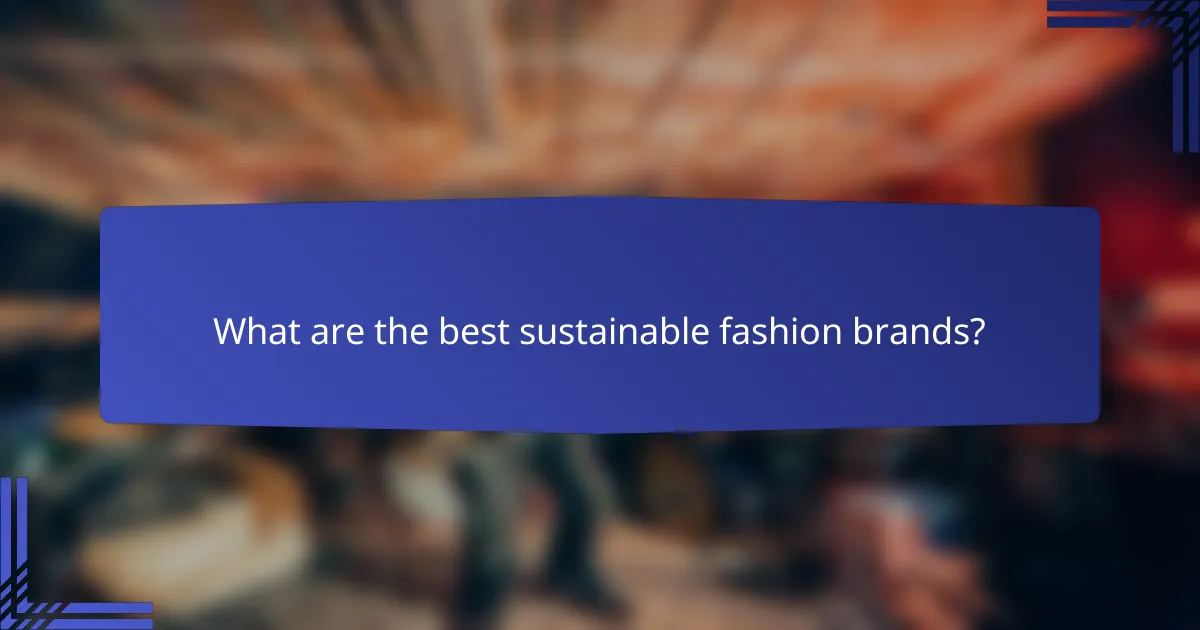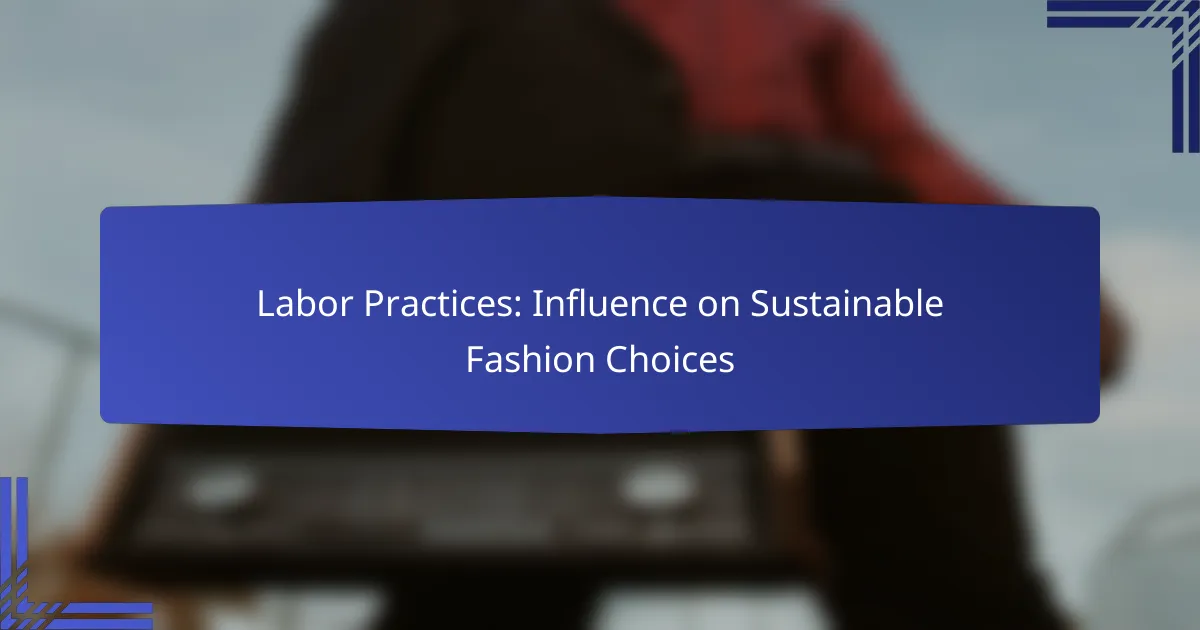Labor practices play a crucial role in shaping sustainable fashion choices, as they directly impact consumer perceptions and preferences. When brands prioritize ethical considerations like fair wages and transparency, they enhance their appeal to conscious consumers who seek to support responsible fashion. By identifying brands that uphold these values, shoppers can make informed decisions that align with their commitment to sustainability.

How do labor practices impact sustainable fashion choices?
Labor practices significantly influence sustainable fashion choices by shaping consumer perceptions and preferences. Ethical considerations, such as fair wages and transparency, directly affect how brands are viewed and how likely consumers are to support them.
Ethical sourcing influences consumer decisions
Ethical sourcing refers to the practice of obtaining materials in a way that respects workers’ rights and the environment. Consumers are increasingly drawn to brands that prioritize sustainable materials and fair labor practices, often opting for products that align with their values. For instance, brands that source organic cotton or recycled materials tend to attract environmentally conscious shoppers.
Many consumers actively seek certifications, such as Fair Trade or Global Organic Textile Standard (GOTS), which indicate adherence to ethical sourcing practices. This trend reflects a growing awareness of the impact of fashion on global labor conditions and the environment.
Fair wages promote brand loyalty
Fair wages are crucial for fostering brand loyalty among consumers who value ethical labor practices. When brands ensure that workers receive a living wage, they not only support the livelihoods of those workers but also build trust with consumers. Shoppers are more likely to return to brands that demonstrate a commitment to fair compensation.
For example, brands that openly communicate their wage policies and the positive impact on workers often see increased customer retention. This loyalty can translate into long-term profitability, as consumers are willing to pay a premium for ethically produced goods.
Transparency affects purchasing behavior
Transparency in labor practices significantly influences purchasing behavior, as consumers demand to know where and how their clothes are made. Brands that provide clear information about their supply chains and labor conditions are more likely to gain consumer trust. This transparency can include details about factory locations, worker treatment, and environmental impact.
In contrast, brands that lack transparency may face skepticism and backlash, leading consumers to seek alternatives. Many shoppers now use apps and websites to verify a brand’s ethical claims, making transparency a key factor in their purchasing decisions.

What are the best sustainable fashion brands?
The best sustainable fashion brands prioritize ethical labor practices, environmentally friendly materials, and transparency in their production processes. Notable examples include Patagonia, Eileen Fisher, and Everlane, each exemplifying unique approaches to sustainability and ethical fashion.
Patagonia’s commitment to fair labor
Patagonia is renowned for its strong commitment to fair labor practices, ensuring that workers in its supply chain receive fair wages and safe working conditions. The brand actively supports initiatives that promote fair trade and has been a pioneer in advocating for labor rights in the fashion industry.
By partnering with Fair Trade Certified factories, Patagonia guarantees that workers earn a premium on their wages, which can be reinvested into their communities. This approach not only enhances worker welfare but also aligns with Patagonia’s mission to create a positive impact on the environment and society.
Eileen Fisher’s ethical production methods
Eileen Fisher emphasizes ethical production methods by focusing on sustainable materials and responsible sourcing. The brand uses organic and recycled fibers, reducing its environmental footprint while ensuring that its garments are produced in a manner that respects workers’ rights.
Additionally, Eileen Fisher has implemented a program called “Renew,” which encourages customers to return used garments for recycling or resale. This initiative promotes circular fashion, minimizing waste and extending the lifecycle of clothing.
Everlane’s transparent pricing model
Everlane’s transparent pricing model sets it apart in the sustainable fashion landscape. The brand openly shares the true costs behind its products, breaking down expenses such as materials, labor, and transportation. This transparency builds trust with consumers and highlights the importance of ethical practices in fashion.
By providing detailed information on its factories and production processes, Everlane empowers customers to make informed choices. This model not only fosters accountability but also encourages other brands to adopt similar practices in their operations.

How can consumers identify ethical fashion brands?
Consumers can identify ethical fashion brands by looking for specific certifications, researching labor practices, and checking for transparency reports. These steps help ensure that brands adhere to fair labor standards and sustainable practices.
Look for certifications like Fair Trade
Certifications such as Fair Trade indicate that a brand meets certain ethical standards in its production processes. These certifications often ensure fair wages, safe working conditions, and environmentally friendly practices.
When shopping, look for labels that display these certifications prominently. Brands with Fair Trade certification typically invest in community development and uphold labor rights, making them a reliable choice for ethical consumers.
Research brand labor practices online
Investigating a brand’s labor practices can reveal a lot about its commitment to ethical fashion. Many brands provide information on their websites regarding their manufacturing processes, labor conditions, and the treatment of workers.
Utilize resources like social media, consumer reviews, and independent watchdog organizations to gather insights. Pay attention to any reports of labor violations or unethical practices, as these can be red flags when considering a purchase.
Check for transparency reports
Transparency reports are documents that outline a brand’s supply chain and labor practices. These reports can provide detailed information about where and how products are made, helping consumers make informed choices.
Look for brands that publish annual transparency reports or sustainability reports. A commitment to transparency often indicates a brand’s accountability and willingness to improve its practices, which is essential for ethical fashion.

What role do labor laws play in sustainable fashion?
Labor laws are crucial in sustainable fashion as they establish standards for worker treatment, safety, and wages, directly influencing ethical production practices. By ensuring compliance with these regulations, brands can promote sustainability while protecting workers’ rights.
Regulations ensure fair treatment of workers
Labor regulations are designed to protect workers from exploitation, ensuring fair wages, safe working conditions, and reasonable working hours. For instance, minimum wage laws and safety standards help prevent abuse and promote a healthier work environment in the fashion industry.
Brands that adhere to these regulations not only support their workforce but also enhance their credibility among consumers who prioritize ethical practices. This commitment can lead to increased customer loyalty and a stronger market position.
Compliance affects brand reputation
Compliance with labor laws significantly impacts a brand’s reputation. Companies that are transparent about their labor practices and demonstrate adherence to regulations are more likely to gain consumer trust. Conversely, non-compliance can lead to public backlash and loss of sales.
Brands can enhance their reputation by engaging in third-party audits and certifications that verify their labor practices. This proactive approach can serve as a marketing tool, appealing to consumers who value sustainability and ethical production.
Labor laws vary by country
Labor laws differ widely across countries, affecting how fashion brands operate globally. For example, European nations often have stricter labor regulations compared to some developing countries, where enforcement may be lax. This disparity can create challenges for brands sourcing materials or manufacturing overseas.
Understanding local labor laws is essential for brands to ensure compliance and avoid legal issues. Companies should conduct thorough research and consider partnering with local organizations to navigate these regulations effectively.

How can brands improve their labor practices?
Brands can enhance their labor practices by adopting fair wage policies, increasing supply chain transparency, and engaging in community development initiatives. These strategies not only support workers but also contribute to a more sustainable fashion industry.
Implement fair wage policies
Fair wage policies ensure that workers receive compensation that meets their basic needs and reflects their skills. Brands should conduct regular wage assessments to align with local living standards, which can vary significantly across regions.
For instance, in countries like Bangladesh, a living wage might be around 8,000 BDT to 12,000 BDT per month, depending on the area. Brands should avoid relying solely on minimum wage laws, which often fall short of providing a decent standard of living.
Enhance supply chain transparency
Increasing supply chain transparency involves openly sharing information about sourcing, production processes, and labor conditions. Brands can achieve this by publishing detailed reports on their supply chain practices and engaging third-party audits.
Transparency not only builds consumer trust but also holds brands accountable for their labor practices. For example, brands can use blockchain technology to trace the origins of their materials, ensuring ethical sourcing and fair treatment of workers throughout the supply chain.
Engage in community development initiatives
Community development initiatives focus on improving the social and economic conditions of workers and their families. Brands can support local education programs, healthcare access, and vocational training to empower communities.
By investing in these initiatives, brands not only enhance their corporate social responsibility but also create a more stable workforce. For example, partnerships with local NGOs can facilitate programs that provide skills training, which ultimately benefits both workers and the brand’s long-term sustainability goals.

What are the challenges in enforcing labor practices?
Enforcing labor practices in the fashion industry faces significant challenges, primarily due to the intricate nature of global supply chains and the associated cost pressures on brands. These factors complicate oversight and compliance, making it difficult to ensure fair labor conditions throughout the production process.
Supply chain complexity hinders oversight
The fashion supply chain often involves multiple tiers, from raw material suppliers to manufacturers and retailers, which can span various countries. This complexity makes it challenging for brands to monitor labor practices effectively, as they may lack visibility into the conditions faced by workers at each level.
For instance, a brand may source cotton from one country, process it in another, and manufacture garments in yet another location. Each step introduces potential risks of labor violations, such as child labor or unsafe working conditions, which can be difficult to detect without rigorous auditing processes.
Cost implications for brands
Implementing robust labor practices often incurs additional costs for brands, which can deter compliance. Brands may face pressure to keep production costs low, leading them to prioritize price over ethical practices. This trade-off can result in a reluctance to invest in fair labor conditions.
For example, brands that choose to pay higher wages or invest in safer working environments may see a rise in production costs, potentially impacting their competitive edge in a price-sensitive market. However, neglecting labor practices can lead to reputational damage and loss of consumer trust, which may ultimately affect long-term profitability.
